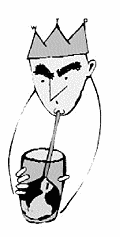The WTO is coming! The WTO is coming!
Get ready for traffic jams, the “protest of the century,” SWAT teams, fat-cat trade ministers, price gouging by local hotels, Bill himself, street sweeps of the homeless, the actual content (oh yeah) of Seattle negotiations, and on and on. Clearly, and no matter what your feelings about the WTO itself, it’s a big story.
But the local media—Weekly included—has not done a good job thus far of describing why people should care. Aside from the downtown traffic jams for a week, why is the WTO important? How will it affect people’s daily lives? So, for the next couple weeks, I’ll try to summarize in this column what the big deal is about: why the protesters are protesting, what the issues are, some of the arguments and responses of free trade proponents—why, in short, you should care.
The WTO was created in 1994 as a successor to the GATT, the General Agreement on Tariffs and Trade, that had governed international trade since World War II. The GATT and other so-called Bretton Woods institutions such as the World Bank and International Monetary Fund served for decades as the model by which developed countries dealt with each other and attempted to develop—or, some would say, exploited the natural resources of—the Third World. This was (and is) known as the neoliberal model, and the WTO is firmly based on it.
With the advent some two decades ago, in the US, Britain, Germany, and other developed countries, of a powerful new conservatism, came growing acceptance of a free market ideology that has led directly to the WTO. The WTO is markedly different from the previous regime in two important ways. First, its “free trade” agreements require the privatization of a wide array— everything, really—of public resources. It requires, in the First and Third World alike, the logical extension of the neoliberal model: letting the free market make all public policy and control the movement of capital, goods, and services.
Secondly, the WTO includes provisions that make its agreements much more legally enforceable than previous trade agreements. If a jurisdiction’s law is found to be “WTO-illegal” and it is not withdrawn, the offending nation faces continuing sanctions equal to the alleged lost value of trade. This is expensive, and, especially for poorer countries, this is a powerful incentive to comply.
Free trade or fair trade?
Generally—despite statements by free trade proponents from President Clinton on down—critics of the WTO oppose not world trade, but the specific mechanisms with which the WTO governs it. These can be divided into two broad categories: the specifics of subagreements on different industries (which I’ll discuss next week), and the structure of the WTO itself.
The power of the WTO to strike down laws is one of the major objections of WTO critics to the organization itself. It represents usurpation of democratically elected bodies by an undemocratic, unelected body that is almost completely dominated by corporate interests. When a country, usually at the request of a company or industry, lodges a complaint that another country’s law is “WTO-illegal,” the complaint is then heard by a secret tribunal of corporate lawyers in Geneva. Proceedings are closed to the public. No appeal is possible. So far, in four years, the Geneva tribunals have decided in favor of every complainant heard.
The judgements have included: overturning a European ban on US hormone-fed beef; overturning a provision of the US Endangered Species Act that protected sea turtles from shrimping nets; striking down American and Brazilian programs that underwrote exporting companies; siding with Chiquita bananas (and the US) against a European program that bought bananas from former Caribbean colonies; and a successful challenge of a US Clean Air Act provision that banned a particular gasoline additive.
More important, perhaps, are the laws never enacted in the first place. The WTO has had a tremendous chilling effect on jurisdictions. We saw a notable example in Seattle when the City Council refused to enact a selective purchasing ordinance in support of pro-democracy forces in Burma. Sure enough, a similar law in Massachusetts is being challenged before the WTO.
The biggest structural concern with the WTO is, quite simply, that transnational corporations are calling the shots and are the primary beneficiaries of its rulings, at the expense of countries that want to protect their environment, food safety, workers’ rights, or other public policy values unrelated to profit. The problem with the WTO, in this view, is not that it promotes free trade; it’s that it bans any other factors as a legitimate basis for public policy. We are left with a secretive, corporate-dominated, free-market-above-all entity that can trump any national government in its policy-making.
That’s the WTO’s structure, and it has raised concerns mostly for the theoretical possibilities for abuse. Next week, I’ll cover the record that’s already been compiled in four years: the impact of agreements that have already been reached, and what’s on the agenda to be added in Seattle.







